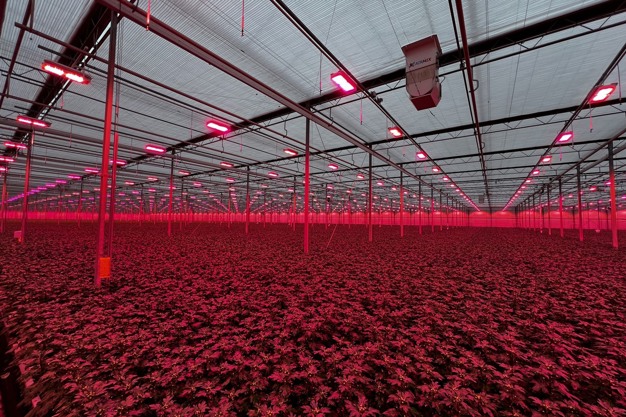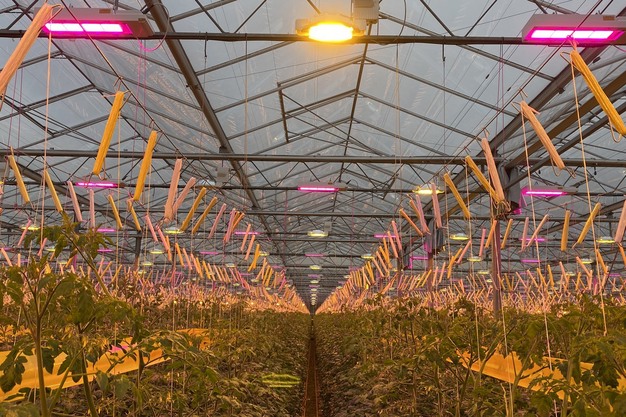Four years ago, Orance - Grow Light Architects embarked on a mission: to demystify the complexities of the 'lighting jungle' for horticultural entrepreneurs. In a market flooded with LED lighting suppliers, the grow light specialists noticed the challenges that horticultural businesses were facing while trying to determine which fixture to invest in. Since its founding in 2019, Orance has been guiding entrepreneurs in addressing this crucial question. However, before making any recommendations, the team delves deeper to ensure the investment is worthwhile and provides advice on strategic and policy-related matters.
"I am firmly convinced that growers who are currently not collaborating intensively and not seeking advice, or do not plan to do so in the near future, will face difficulties in the long term," says Arno Wartewig thoughtfully.
Successful entrepreneurs collaborate intensively, both internally and externally. Internally, they delegate tasks within a diverse management team, and externally, they engage in partnerships within the supply chain and with specialized knowledge partners. Trying to do everything on your own is simply no longer feasible. For instance, quickly comparing lighting quotations in an Excel file and only comparing the figures is no longer sufficient. Actually, it wasn't sufficient back then, either. Now more than ever, it is crucial to interpret information and identify risks to ultimately make the right decisions that contribute to growth."

Technical knowledge is essential
The team of grow light specialists serves as a strategic partner for entrepreneurs in the field of horticultural lighting. "We believe in the value of experience, without just 'counting grey hairs,' of course," laughs the man who founded the company with René van der Sar.
"However, you must be able to see developments in a broader perspective. Lighting is a part of the whole. Collaboration and integration are essential. An example? Nowadays, flexibility is extremely important, and dynamic lighting has become a new standard to respond more easily to market developments. But this only works optimally when the new techniques are integrated into the climate computer, which requests many technical details from various market parties."
Horticultural lighting is, to a large extent, a technical matter, especially with all the new possibilities that LED lighting offers. However, compared to four years ago, it involves more than just the fixture. "In addition to developments in LED technology, such as dimming and the ability to control the spectrum, LED is now inseparably linked to active dehumidification and energy screens. The transition from HPS to LED thus impacts almost all processes of a modern horticultural company and is certainly not a straightforward step."

A changing market
In addition to all changes on the technical side, with all possibilities around LED, there are also changes in the sector. "We have been active in the horticulture business for quite some time, but one of the major changes in the market is the fact that we increasingly do business with companies rather than individual entrepreneurs. Our clients have clearly made the transition from working in the operation to working on the business. As a result, we also see that organizations are changing in terms of structure and becoming more professional. For instance, many of our clients are expanding to multiple locations."
This leads to changing needs, they notice at Orance. Specialized knowledge about grow lighting and its application is inherent in our services. At the same time, the focus is increasingly on macro developments. "Grow lighting must align with the multi-year strategy of the entrepreneur. In such a strategy, themes like sustainability and collaboration should not be missing."
It's all about risk management
During the launch of Orance, the focus was on unraveling 'the lighting jungle,' followed by flexibility during times of crisis. However, the main focus is currently on risk management, according to Arno. "You see Dutch entrepreneurs attempting to limit the impact of external factors they cannot control. Consider the recent news about raising taxes on energy, with the announced plans and the resulting uncertainty in the long term."
In the Netherlands, this has led to increasing interest in relatively new technologies for horticulture, such as E-boilers, buffering of electrical energy, and, of course, LED lighting. These techniques can provide the necessary flexibility for the entrepreneur and make a significant contribution to the energy transition and further sustainability. "Few sectors innovate as rapidly as horticulture. For example, our company has been directly involved in replacing over 350,000 HPS fixtures with LED in recent years. However, this pace is not without risks; therefore, managing these risks is essential for perspective and growth."
For more information:
Orance
Stoelmatter 7d, 2292 JM
Wateringen, the Netherlands
Email: info@orance.nl
www.orance.nl
